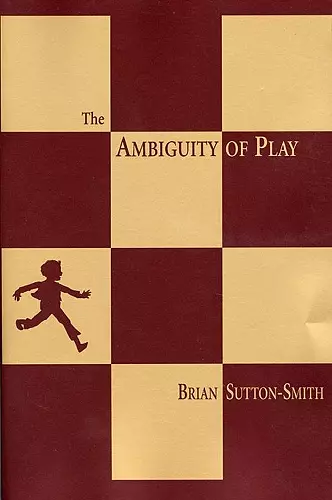The Ambiguity of Play
Format:Paperback
Publisher:Harvard University Press
Published:14th Jun '01
Should be back in stock very soon

A wonderful and important book. Its strength is its depth and its breadth. Play is discussed in incredibly close detail, and from diverse perspectives: from anthropology to zoology, to literary criticism and biology. This work represents the one most thorough discussion of play that we have. -- Anthony Pellegrini, University of Georgia A stunning book and a superbly scholarly undertaking which will make it impossible to discuss play in the simplistic terms we are accustomed to. -- Greta Fein, University of Maryland at College Park The Ambiguity of Play is an extremely important contribution to theoretical discussions about play not only in the United States but around the world. The book provides a platform for further theoretical reflection, interdisciplinary dialogue, and for critical examination of long-held beliefs about child development and education. Sutton-Smith succeeds at maintaining a playful tone throughout, and lives up in his own rhetoric to the topic at hand. -- Petra Hesse, Wheelock College
Is play an adaptation that teaches us skills and inducts us into communities? Is it power, pursued in games of prowess, or fate, deployed in games of chance, or daydreaming, enacted in art? Sutton-Smith considers each possibility as framed in disciplines ranging from biology, psychology, and education to metaphysics, mathematics, and sociology.
Every child knows what it means to play, but the rest of us can merely speculate. Is it a kind of adaptation, teaching us skills, inducting us into certain communities? Is it power, pursued in games of prowess? Fate, deployed in games of chance? Daydreaming, enacted in art? Or is it just frivolity? Brian Sutton-Smith, a leading proponent of play theory, considers each possibility as it has been proposed, elaborated, and debated in disciplines from biology, psychology, and education to metaphysics, mathematics, and sociology.
Sutton-Smith focuses on play theories rooted in seven distinct “rhetorics”—the ancient discourses of Fate, Power, Communal Identity, and Frivolity and the modern discourses of Progress, the Imaginary, and the Self. In a sweeping analysis that moves from the question of play in child development to the implications of play for the Western work ethic, he explores the values, historical sources, and interests that have dictated the terms and forms of play put forth in each discourse’s “objective” theory.
This work reveals more distinctions and disjunctions than affinities, with one striking exception: however different their descriptions and interpretations of play, each rhetoric reveals a quirkiness, redundancy, and flexibility. In light of this, Sutton-Smith suggests that play might provide a model of the variability that allows for “natural” selection. As a form of mental feedback, play might nullify the rigidity that sets in after successful adaption, thus reinforcing animal and human variability. Further, he shows how these discourses, despite their differences, might offer the components for a new social science of play.
Brian Sutton-Smith presents a lively, contemplative and challenging theoretical discussion of the ‘category of diverse learnings’…that make up play… Sutton-Smith presents a variety of play dimensions that cause disturbance of theoretical certainty and bring together hitherto unconnected ideas on play in the tradition of creativity. The book explores its chosen rhetorics in a scholarly and yet undeniably accessible way. The material included is multi-faceted and multi-layered, drawing on theories across the centuries and presenting a case for a new look at play. Play is taken beyond the rhetoric of progress, leaving the reader alive and alert to the possibilities of play that transcend generations and cultures. -- Jill Williams * British Journal of Educational Studies *
This book provides a comprehensive analysis of extant theory and research on the subject of play in children and adults in a variety of cultural contexts with relevant comparisons to play in nonhuman species. The work is thorough and well referenced and provides new insights on a classic topic in children’s social development. The primary issue addressed is the ambiguous nature of play. Although we have a sense of what constitutes play, when asked to define it, explain its function, or even identify players, its paradoxical nature becomes apparent—it is and is not what it appears to be. Does and does not have a function, is and is not the purview of children. * Child Development Abstracts & Bibliography *
A wonderful and important book. Its strength is its depth and its breadth. Play is discussed in incredibly close detail, and from diverse perspectives: from anthropology to zoology, to literary criticism and biology. This work represents the one most thorough discussion of play that we have. -- Anthony Pellegrini, University of Georgia
A stunning book and a superbly scholarly undertaking which will make it impossible to discuss play in the simplistic terms we are accustomed to. -- Greta Fein, University of Maryland at College Park
The Ambiguity of Play is an extremely important contribution to theoretical discussions about play not only in the United States but around the world. The book provides a platform for further theoretical reflection, interdisciplinary dialogue, and for critical examination of long-held beliefs about child development and education. Sutton-Smith succeeds at maintaining a playful tone throughout, and lives up in his own rhetoric to the topic at hand. -- Petra Hesse, Wheelock College
ISBN: 9780674005815
Dimensions: unknown
Weight: 381g
288 pages